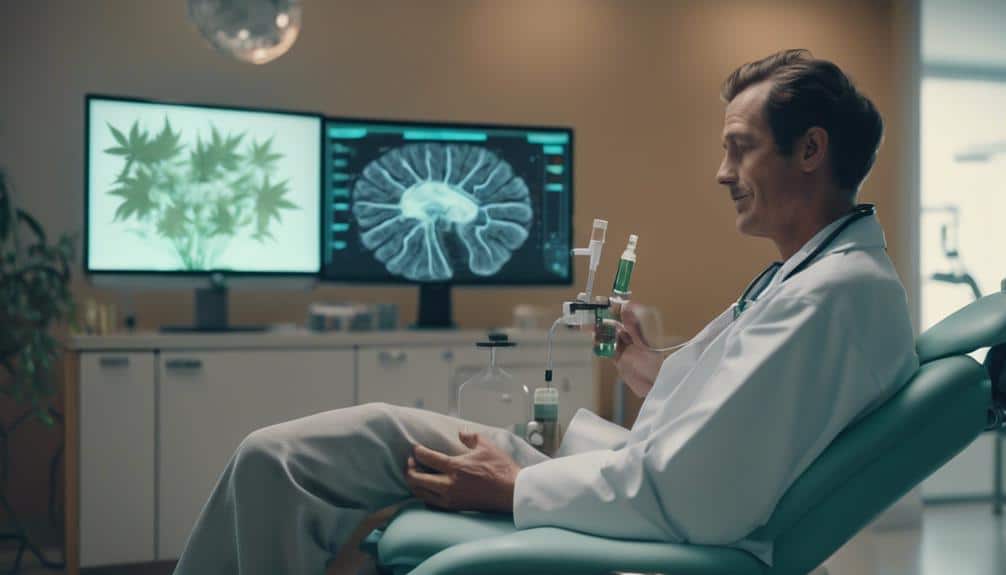In Delaware, medical marijuana therapies are not only innovative but also meticulously regulated to ensure patient safety and effectiveness. The state’s dispensaries utilize state-of-the-art technology for precise dosages and tailored strain selections, ensuring patients receive the best possible care. With a strong emphasis on patient education and continuous cannabinoid research, Delaware’s approach is both thorough and forward-thinking. But what truly sets Delaware apart in the field of medical marijuana? Let’s explore how these advancements are shaping chronic pain management and epilepsy treatments, along with the roles of legislative support and healthcare community involvement.
Table of Contents
Advanced Dispensary Services

Advanced dispensary services in Delaware, driven by stringent regulatory standards, ensure that patients receive high-quality, evidence-based medical marijuana therapies tailored to their specific needs. These services heavily rely on cutting-edge dispensary technology to guarantee precise dosage, strain selection, and administration methods.
As a healthcare provider, you must understand the importance of these technologies in maximizing therapeutic outcomes and minimizing potential risks. Patient education is another cornerstone of advanced dispensary services. You play an essential role in educating patients about various forms of medical marijuana including edibles, tinctures, and vaporizers.
Thorough education ensures patients make informed decisions and adhere to their prescribed treatments. This involves explaining the pharmacokinetics and pharmacodynamics of cannabinoids as well as potential side effects and interactions with other medications. Moreover, advanced dispensary services often incorporate digital platforms for monitoring patient progress, enabling real-time adjustments to treatment plans.
By utilizing these platforms, you can track patient responses and provide personalized care. This evidence-based approach not only enhances patient satisfaction but also contributes to a growing body of data supporting the efficacy of medical marijuana. By leveraging these advanced technologies and prioritizing patient education, you’re ensuring that Delaware continues to lead in medical marijuana therapy.
Cannabinoid Research Initiatives
Building on the foundation of advanced dispensary services, ongoing cannabinoid research initiatives in Delaware aim to uncover new therapeutic potentials and refine existing treatments based on rigorous scientific evidence. You’re likely aware that clinical trials are essential for validating the efficacy and safety of these therapies. Delaware’s dedication to such trials is proof of its commitment to patient care and innovation.
Researchers aren’t just focusing on natural cannabinoids but are also exploring synthetic cannabinoids. These lab-created compounds can offer controlled, consistent doses potentially leading to more predictable therapeutic outcomes. By participating in these initiatives, you’re contributing to a growing body of knowledge that could revolutionize treatment options for various conditions.
Consider the following:
- Hope for chronic pain sufferers: New treatments could offer relief where traditional medications have failed.
- Enhanced patient quality of life: Better management of symptoms leads to a more fulfilling daily existence.
- Scientific validation: Ensuring therapies are backed by solid evidence promotes trust and adoption.
- Innovative breakthroughs: Potentially discovering new applications for cannabinoids in medicine.
- Societal impact: Advancing research benefits not just patients but society as a whole.
This initiative highlights Delaware’s leadership in cannabinoid research, striving for breakthroughs that could make a profound difference in healthcare.
Personalized Treatment Plans

Designing personalized treatment plans for medical marijuana patients in Delaware ensures therapies are tailored to individual needs, maximizing therapeutic benefits and minimizing adverse effects. By integrating genetic profiling, healthcare providers can predict how a patient might metabolize and respond to various cannabinoids. This precision medicine approach ensures you receive the most effective strains and dosages based on your unique genetic makeup.
Symptom tracking plays an essential role in continuously refining these personalized plans. Regularly monitoring and documenting your symptoms allows adjustments to be made in real-time, ensuring ongoing efficacy and minimizing side effects. Advanced digital tools enable you to record symptom changes, providing valuable data that healthcare providers can analyze. This evidence-based strategy ensures that your treatment evolves as your condition does.
By utilizing a combination of genetic profiling and symptom tracking, Delaware’s medical marijuana programs focus on delivering individualized care. This approach not only enhances therapeutic outcomes but also improves patient satisfaction and overall quality of life. By prioritizing personalized treatment plans, Delaware sets a standard in patient-centric medical marijuana therapies, ensuring you receive the most precise and effective care possible.
Chronic Pain Management
Managing chronic pain with medical marijuana in Delaware involves a thorough understanding of how cannabinoids interact with the body’s endocannabinoid system to alleviate symptoms.
You need to be well-versed in patient education and precise dosage guidelines to ensure effective pain management.
By educating patients on how cannabinoids like THC and CBD can modulate pain signals, you empower them to make informed decisions. Providing clear dosage guidelines is crucial in achieving the best balance between pain relief and minimal side effects.
Consider the potential impacts on patients’ lives:
- Improved quality of life: Chronic pain often limits daily activities and overall well-being.
- Reduced dependency on opioids: Medical marijuana can be a safer alternative with fewer risks of addiction.
- Better sleep: Managing pain effectively can lead to improved sleep patterns.
- Enhanced mental health: Alleviating chronic pain can reduce anxiety and depression.
- Increased mobility: Effective pain management can improve physical function and mobility.
Clinical studies validate the efficacy of cannabinoids in chronic pain management. By following evidence-based practices, you offer patients a viable alternative to traditional pain medications. Remember, success lies in detailed patient education and adhering to well-defined dosage guidelines. This approach ensures that patients receive maximum therapeutic benefit with minimal adverse effects.
Epilepsy Treatment Advances

Cannabinoids have shown promise not only in chronic pain management but also in recent advances for epilepsy treatment with medical marijuana, particularly by reducing seizure frequency and severity. Cannabidiol (CBD), a non-psychoactive compound, is at the forefront of these developments.
Research indicates that CBD offers neuroprotective benefits, which can be vital in managing epilepsy. Clinical trials have provided compelling evidence. For instance, a study published in The New England Journal of Medicine reported that CBD reduced seizure frequency by 39% in patients with Dravet syndrome, a severe form of epilepsy.
Additionally, CBD has shown promise in minimizing seizures in Lennox-Gastaut syndrome, another treatment-resistant epilepsy type. The neuroprotective properties of CBD can help safeguard brain cells, potentially reducing the long-term impact of frequent seizures.
It’s important to consider the individualized nature of epilepsy treatment. Not all patients respond similarly to CBD but for many it offers a significant reduction in seizure activity. As you continue exploring medical marijuana therapies, it’s crucial to stay informed about ongoing research and clinical trials.
These advances not only enhance patients’ quality of life but also provide critical insights into effective epilepsy management.
Legislative Support Systems
Legislative support systems in Delaware play an essential role in facilitating access to medical marijuana therapies for patients with qualifying medical conditions. By establishing a robust legal framework, the state guarantees that patients can legally obtain and use medical marijuana under healthcare professionals’ guidance. This framework also mandates thorough patient education ensuring individuals understand the benefits and potential risks associated with these therapies.
The key provisions of Delaware’s legislative support system include:
- Clear eligibility criteria: Patients must have a qualifying medical condition to access medical marijuana ensuring therapy is utilized by those who truly need it.
- Regulated dispensaries: Licensed dispensaries adhere to stringent standards ensuring the quality and safety of medical marijuana products.
- Patient education programs: These initiatives provide important information on dosage, administration methods, and potential side effects empowering patients to make informed decisions.
- Legal protections: Patients and caregivers are safeguarded from prosecution allowing them to use medical marijuana without fear of legal repercussions.
- Ongoing research support: The state encourages scientific studies to continually assess the efficacy and safety of medical marijuana therapies benefiting current and future patients.
Healthcare Community Involvement

Healthcare professionals in Delaware play an essential role in the implementation and success of medical marijuana therapies by providing evidence-based recommendations and monitoring patient outcomes. As a healthcare provider, you must engage in rigorous patient advocacy ensuring each patient receives personalized, effective care. This involves staying current with the latest research and clinical guidelines on medical marijuana to make informed decisions.
Community outreach is another pivotal aspect of your role. By educating the public and other healthcare providers about the benefits and risks of medical marijuana, you can dispel misconceptions and build a more informed community. This outreach can take various forms such as workshops, seminars, informational sessions where you share scientific data and clinical experiences.
Monitoring patient outcomes is essential for continual improvement. You should collect and analyze data on the efficacy and safety of medical marijuana treatments tailoring therapies based on individual patient responses. This evidence-based approach not only enhances patient care but also contributes to the broader medical community’s understanding of medical marijuana.
Conclusion
You might worry that medical marijuana isn’t backed by science, but Delaware’s approach is firmly grounded in rigorous research and evidence-based practices. With advanced dispensary services, personalized treatment plans, and a focus on chronic pain and epilepsy, Delaware prioritizes patient well-being and efficacy.
Legislative support and healthcare community involvement further solidify its dedication. Trust that Delaware’s inclusive, innovative therapies prioritize your health through scientifically proven methods and cutting-edge technology.
If you’re curious to learn more about how medical marijuana can benefit you, I invite you to visit Cannabis Docs of Delaware. Our team is here to help answer any questions you might have. Feel free to give us a call at (855) 420-6797. We’d love to chat and provide you with all the information you need to make an informed decision about your health.

